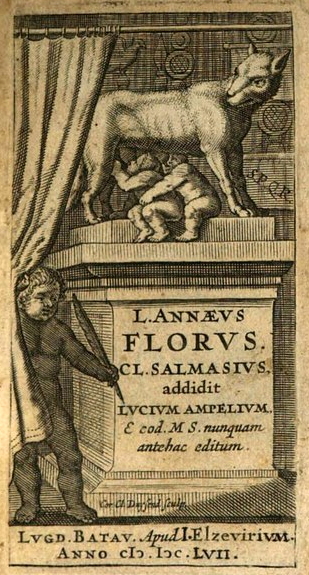Related Research Articles

Aelianus Tacticus, also known as Aelian, was a Greek military writer who lived in Rome.

Gaius Suetonius Tranquillus, commonly referred to as Suetonius, was a Roman historian who wrote during the early Imperial era of the Roman Empire. His most important surviving work is De vita Caesarum, commonly known in English as The Twelve Caesars, a set of biographies of 12 successive Roman rulers from Julius Caesar to Domitian. Other works by Suetonius concerned the daily life of Rome, politics, oratory, and the lives of famous writers, including poets, historians, and grammarians. A few of these books have partially survived, but many have been lost.
Favorinus was a Roman sophist and skeptic philosopher who flourished during the reign of Hadrian and the Second Sophistic.
Philochorus of Athens, was a Greek historian and Atthidographer of the third century BC, and a member of a priestly family. He was a seer and interpreter of signs, and a man of considerable influence.
Diogenianus was a Greek grammarian from Heraclea in Pontus who flourished during the reign of Hadrian (117–138). He was the author of an alphabetical lexicon, chiefly of poetical words, abridged from the great lexicon of Pamphilus of Alexandria and other similar works. It was also known by the title Περιεργοπένητες. It formed the basis of the lexicon, or rather glossary, of Hesychius of Alexandria, which is described in the preface as a new edition of the work of Diogenianus. A collection of 776 proverbs under his name is still extant bearing the name Παροιμίαι δημώδεις ἐκ τῆς Διογενιανοῦ συναγωγῆς, probably an abridgment of the collection made by himself from his lexicon. Diogenianus was also the author of an "Anthology of epigrams about rivers, lakes, cliffs, mountains and mountain ridges", a list of all the towns in the world ., and of a list of rivers

Antimachus of Colophon, or of Claros, was a Greek poet and grammarian, who flourished about 400 BC.

Friedrich Wilhelm Schneidewin, was a German classical scholar.
Phlegon of Tralles was a Greek writer and freedman of the emperor Hadrian, who lived in the 2nd century AD.
Achilles Tatius of Alexandria was a Roman-era Greek writer of the 2nd century AD whose fame is attached to his only surviving work, the ancient Greek novel, or romance, The Adventures of Leucippe and Clitophon.
Hermagoras of Temnos was an Ancient Greek rhetorician of the Rhodian school and teacher of rhetoric in Rome, where the Suda states he died at an advanced age.

Euphorion of Chalcis was a Greek poet and grammarian, born at Chalcis in Euboea in the 126th olympiad.
Michael Apostolius or Apostolius Paroemiographus, i.e. Apostolius the proverb-writer, was a Greek teacher, writer and copyist who lived in the fifteenth century.
Dositheus Magister was a Greek grammarian who flourished in Rome in the 4th century AD.

Soranus of Ephesus was a Greek physician. He was born in Ephesus but practiced in Alexandria and subsequently in Rome, and was one of the chief representatives of the Methodic school of medicine. Several of his writings still survive, most notably his four-volume treatise on gynecology, and a Latin translation of his On Acute and Chronic Diseases.
Marcellus of Side a native of Side in Pamphylia, was a physician born towards the end of the 1st century AD, and lived during the reigns of Hadrian and Antoninus Pius, 117-161 AD. He wrote a long medical poem in Greek hexameter verse, consisting of forty-two books, which was held in such estimation, that it was ordered by the emperors to be placed in the public libraries at Rome. Of this work only two fragments remain, one Περὶ Λυκανθρώπου, De Lycanthropia, and the other Ἰατρικὰ περὶ Ἰχθύων, De Remediis ex Piscibus. Of these the former is preserved by Aëtius of Amida. The second fragment consists of about 100 verses.

Three main sets of works are attributed to Florus : Virgilius orator an poeta, the Epitome of Roman History and a collection of 14 short poems. As to whether these were composed by the same person, or set of people, is unclear, but the works are variously attributed to:

Artemidorus Capito(n) was a Greek physician and grammarian at Rome.

This article lists historical events that occurred between 101–200 in modern-day Lebanon or regarding its people.
In Greek mythology, Macaria is a daughter of the divine hero Heracles. After his immolation, Eurystheus hunted down the descendants of the hero, eventually besieging them in Athens. Macaria offered herself as sacrifice in order to save her kin and the city.
Macaria is an obscure figure in ancient Greek mythology and religion, reportedly the daughter of Hades, god and king of the Underworld. Macaria is only mentioned in a medieval source of the tenth century, which offers little documentation on her character and personhood. She has no accompanying mythology of her own, and there is no evidence she received any worship.
References
 Smith, William, ed. (1873). "Zeno'bius". Dictionary of Greek and Roman Biography and Mythology .
Smith, William, ed. (1873). "Zeno'bius". Dictionary of Greek and Roman Biography and Mythology .- This article incorporates text from a publication now in the public domain : Chisholm, Hugh, ed. (1911). "Zenobius". Encyclopædia Britannica . Vol. 28 (11th ed.). Cambridge University Press. p. 972. Endnotes:
- T. Gaisford (1836) and E. L. Leutsch–F. W. Schneiderwin (1839)
- B. E. Miller, Mélanges de littérature grecque (1868)
- W. Christ, Griechische Litteraturgeschichte (1898)